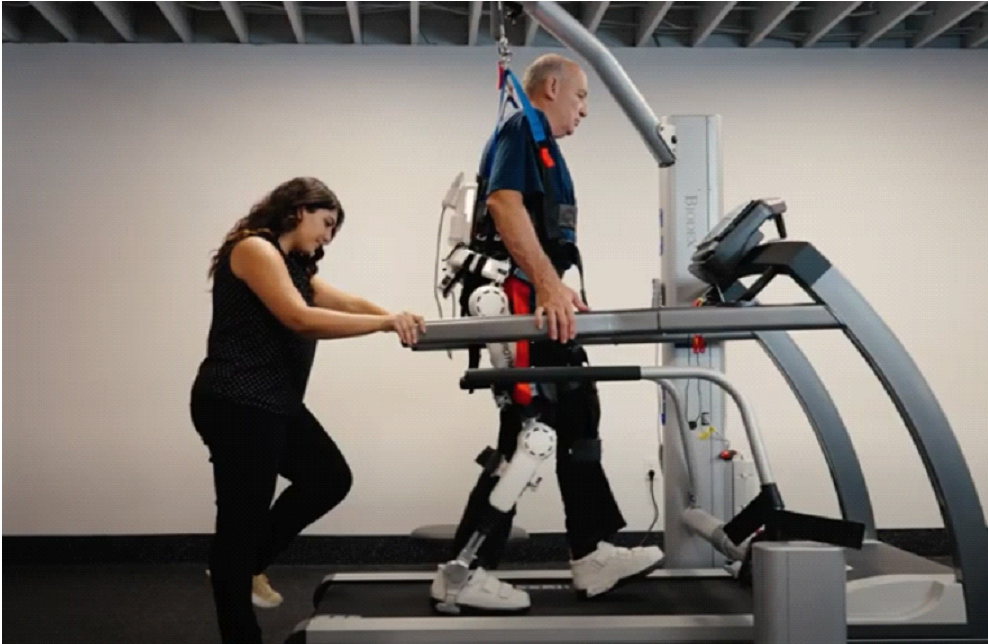
By Dr. Martin Nguyen, Director of Community Relations for RISE Healthcare Group
Recovery after a stroke can be difficult and the first thing stroke patients want to know is when they’ll walk again and how long it will take to get there.
As a physical therapist, I know stroke recovery is challenging physically, mentally, and emotionally. That’s why it’s important that stroke patients receive proper rehabilitation to help them regain confidence and learn how to walk again.
A customized rehabilitation program is best for stroke patients who are looking to walk again. The sooner you receive customized treatment after your stroke – the better.
In this article we’ll touch on how to recover after a stroke through combining physical therapy and innovative technology. Let’s dive in.
Why does walking become difficult after a stroke?
A stroke occurs when the supply of blood to an individual’s brain is compromised. This decreases and deprives the brain from receiving the oxygen over an extended time that it needs to fully function, which leads to brain tissue damage.
Once a stroke occurs, your cognitive skills, motor abilities, sensation, vision, communication and personality can be affected. In terms of motor abilities, your gross motor skills such as movements of your legs, arms, and even torso can be affected after a stroke, which can have a negative impact on your gait.
If you’ve experienced a stroke, you will more than likely experience weakness on one side of the body (hemiparesis) or paralysis on one side of the body (called hemiplegia).
The level of weakness or paralysis is dependent on the severity of the stroke for the individual. With both hemiparesis and hemiplegia an individual’s gait is compromised. Fortunately, recovery from this is possible for most stroke patients through proper rehabilitation. Next, you’ll find out how!
Can I relearn to walk after a stroke?
Proper rehabilitation is the key to regaining the ability to walk after a stroke. The best person to help with this is a physical therapist. These are highly trained and specialized professionals who can best support the restoration of function after an injury such as a stroke.
Physical Therapy exercises and activities can help individuals stimulate, retrain, and rewire the nervous system (also known as neuroplasticity). This helps the brain to become more efficient with various tasks that an individual does throughout the day by strengthening neural pathways.
Like any other skill or task, practice makes perfect. Re-learning how to walk after a stroke requires practice from the individual and guidance of a PT. Getting on a consistent PT regimen with your exercises will help rewire your brain and lead to improving your gait.
How does the HAL exoskeleton help recovery after a stroke?
The Hybrid Assistive Limb, or “HAL”, is a one-of-a-kind human exoskeleton used in the medical rehabilitation setting for those struggling with mobility such as post-stroke symptoms. Through EMG electrodes placed on the skin, the HAL exoskeleton is able to pick up on the faintest nerve signals coming from the individual’s brain and, as a result, create movement based on the wearer’s intention and thoughts.
The goal of the HAL technology is to strengthen neural pathways in a patient and to improve neuroplasticity where there are weak or diminished signals. These changes at the neural level can allow for massive gains at the functional level.
As a physical therapist, I’ve been using the HAL exoskeleton in combination with my traditional neuro PT to speed up the recovery process for my post-stroke patients. I have seen improvements in gait quality, quicker gait speed, and overall, more confidence in my patients.
Hope for recovery after a stroke
The chances for you to regain your ability to walk after a stroke are increased with a consistent rehabilitation program.
With today’s advanced cutting-edge technology, such as the HAL exoskeleton, you should be hopeful about your road to recovery.
Author Bio
Name: Martin Nguyen, PT, DPT, CAFS
Title/Role: Director of Community Relations for RISE Healthcare Group
Hometown: Houston, Texas
Education:
-Undergraduate: University of Texas at Austin
-Graduate: University of the Incarnate Word School of Physical Therapy